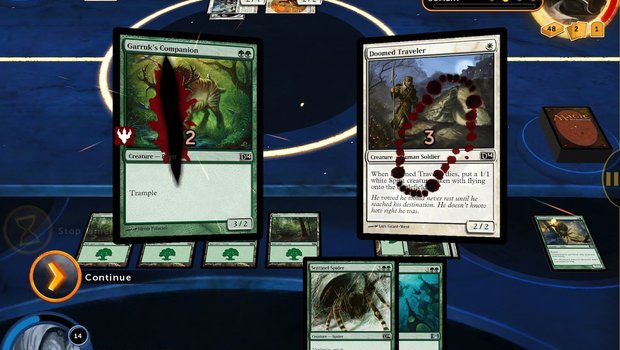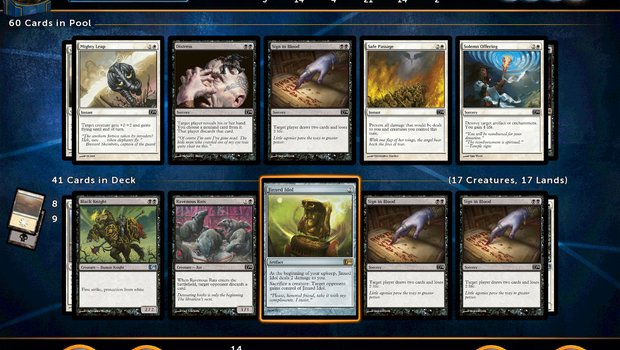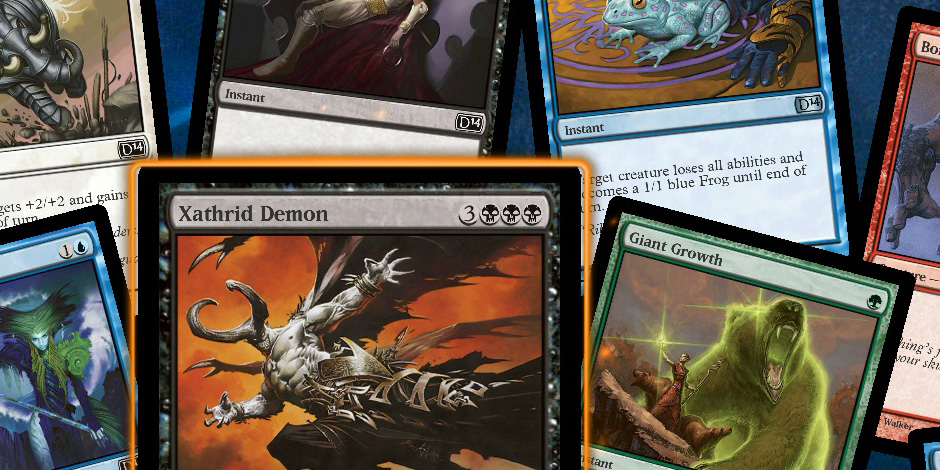GamesRadar+ Verdict
Pros
- +
Challenge mode offers clever scenarios
- +
Sealed Deck mode finally introduces deck building
- +
The visuals bring this card game to life
Cons
- -
Lack of visual feedback on plays
- -
The timed system for turns is still frustrating
- -
Wonky tutorials leave new players confused
Why you can trust GamesRadar+
Giving your imagination a rest, Magic 2014: Duels of the Planeswalkers brings all the glorious instant-casting, deck-milling, and creature-slinging to life. It doesn’t just bring the new expansions to the table either; this installment has compounded on successes and issues from their previous releases. This means two things. One, newly included features such as the Sealed Deck mode mix it up for long time players. And two, there are still mechanical hiccups that can’t help but remind you that this was once, and still primarily is, a card game.
If you weren’t already familiar, the game of Magic the Gathering primarily relies on the interplay of five different play styles or “colors” to move your opponent’s life from 20 to 0. After 20 years, there are thousands of cards and an incredible amount of rules that come with them.Duels of the Planeswalkers 2014 makes a good effort to ease players of varying experience levels into the game through tiered tutorial levels. While the tutorials for the non-Magic player cover the basics, there were still many crucial, yet more advanced, rules that were left out. For instance: how and when damage is resolved during combat phase, often called the “stack”, is uncommunicated, and it leads to a confusing stream of changing life totals that can give even an experienced player pause.

"This installment has compounded on successes and issues from their previous releases."
Once you do get a working knowledge of the game (or already have it), there are some interesting new features that add good variety to the game. One example is the newly introduced, and oft-requested, Sealed Deck mode. A highly customizable experience, Sealed Deck puts one of the most fun variations of the physical card game itself into players’ hands. You’ll start out with six booster packs to open, and you’ll use these to create your very own home-cooked deck. The UI for this process is laid out well, and even provides feedback on certain aspects of the deck you’re building. After you make your deck you can test it against six AI, and after winning those duels you can bring the deck online to battle against other players. The entire feature is a great exercise in understanding the rules of the game, all while giving you control over your entire dueling deck. It’s not complete control though, as you are limited to the cards in the booster packs you draw.
Another game mode is Challenges, which offers an non-traditional way to learn more about the game and hone your skills. Each challenge gives you a set of parameters to play within to beat a certain circumstance within one turn. As an example: you’ll have to use three specific creatures and spells to defeat a player with 9 life remaining, while only having 6 life yourself. Succeed, and you’ll move onto the next challenge. There are 10 of them, and while they get progressively more difficult, each feels rewarding when you finally have that satisfying “ah ha” moment.

"If you’re a fan of Magic (or want to be), this is a great game to pick up."
Even with these different game modes, this is still a video game version of a tabletop card game, and this introduces issues that have been seen before in other versions of Duels of the Planeswalkers. One such is the game’s countdown timer, which runs between each phase of players’ turns. In the real world, most opponents will not be holding a stopwatch over your head or be unrelenting of mistakes, but the video game takes a more punitive approach. Even a seasoned player will find themselves messing up multi-stop plays or forgetting to assign blockers, and the timer system simply isn’t flexible enough to accommodate this. Also, dealing with specific abilities of cards, as well as searching through your deck, are other parts of Magic that still haven't been naturally translated to the digital realm. The good news is that these issues aren’t due to many (or any) residual buggy issues with the game. Clicks, drags, and animations all work as they should.
The multiplayer mode in Magic 2014 is a fun yet limited experience. As with the single-player mode of the game, there weren’t any technical hiccups to impede online play. In fact, it even felt better because the time delays when the other player was thinking or reading your card were very reminiscent of the physical game itself. There are three game modes to choose from (free-for-all, two-headed dragon, and Sealed Deck), and as usual you are still bound to either the 10 pre-built decks of the game or your small Sealed Deck creations. Dealing with matches, the game doesn’t do much refereeing, and even let’s you quit the duel without any sort of warning or penalty. This leads to a very casual online setting, sometimes too casual as some players just get up and leave after a few bad turns. For the competitive players though, there is a leaderboard that ranks you based on your performance.
If you’re a fan of Magic (or want to be), this is a great game to pick up. The visual representation of the duels, as well as rewarding Challenges and time-consuming Sealed Deck mode, all make for a fun experience for the player. Now if only they’d use their powers to make a dedicated custom deck building tool with every magic card ever made. That would be something…
This review was conducted using the PC version of the game.
More info
| Genre | Strategy |
| Description | The latest in the Duels of the Planeswalkers franchise introduces Sealed play. |
| Platform | "Xbox 360","PS3","PC","Android","iPad" |
| US censor rating | "Teen","Teen","Teen","Teen","Teen" |
| UK censor rating | "","","","","" |
| Release date | 1 January 1970 (US), 1 January 1970 (UK) |
Zach was once an Associate Editor for Future, but has since moved into games development. He's worked at EA and Sledgehammer Games, but is now Narrative Director on League of Legends and Valorant at Riot Games.



